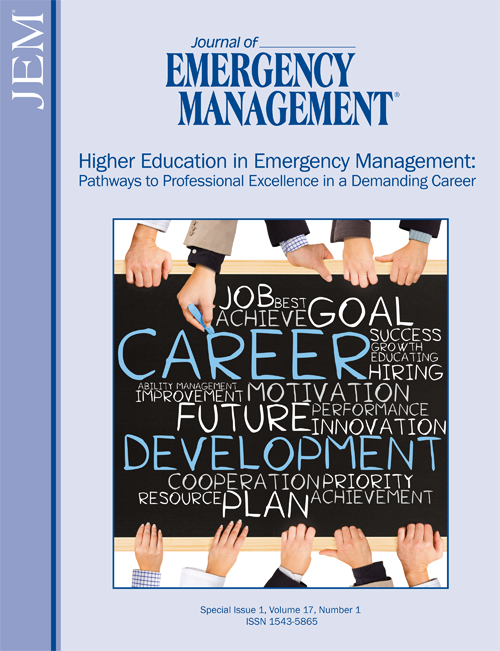The next generation core competencies for emergency management
DOI:
https://doi.org/10.5055/jem.2019.0393Keywords:
emergency management, core competencies, competencies, higher education, competency MeasurementAbstract
The Next Generation Core Competencies (NGCC) guide the professional development of future emergency managers. Once familiar roles are evolving as the world grows more interdependent; at the same time, disaster risk factors are intensified by the changing interactions between the social, built, and physical environments. The updated edition of emergency management core competencies is particularly important for refining the trajectory of the emergency management discipline and developing capacities requisite to reducing disaster risk and building resilient communities in the midst of a turbulent, complex, and uncertain future.
The NGCC project was a multiphase study conducted by a FEMA-sponsored focus group. Oriented toward future needs, the competencies have been built on the current emergency management competencies, a review of related competencies and global risk trends, a multiphase Delphi study, and wider emergency management community listening sessions. Behavioral anchors and key actions for measurement accompany the new core competencies. The overarching goal of the work is to establish the next generation emergency management core competencies, which are likely to underpin the emergency management workforce of 2030 and beyond. The 13 core competencies fall into three nested categories that are interrelated, but have attributes that build the individual, the practitioner, or relationships.
References
Castells M: Communication Power. Oxford, UK: Oxford University Press, 2009.
Castells M, Cardoso G (eds.): The Network Society: From Knowledge to Policy. Washington, DC: Johns Hopkins Center for Transatlantic Relations, 2005.
Harvard University: Competency Dictionary. Bridgeville, PA: Development Dimensions International Inc., n.d. Available at https://www.campusservices.harvard.edu/system/files/documents/1865/harvard_competency_dictionary_complete.pdf. Accessed on January 21, 2017.
Prahalad CK, Hamel G: The core competence of the corporation. Harv Bus Rev. 1990; 68(3): 79-91.
Jensen SJ, Feldmann-Jensen S, Johnston D, et al.: The emergence of a globalized system for disaster risk management and challenges for appropriate governance. Int J Disaster Risk Sci. 2015; 6(1): 87-93. Available at http://link.springer.com/article/10.1007%2Fs13753-015-0043-8.
Federal Emergency Management Agency: Crisis response and disaster resilience 2030: Forging strategic action in an age of uncertainty. Federal Emergency Management Agency Web site. 2012. Available at https://www.fema.gov/media-library/assets/documents/24174.
Cresswell JW: Research Design: Qualitative, Quantitative, and Mixed Methods Approaches. Thousand Oaks, CA: Sage Publications, 2014.
Smith PC, Kendall LM. Retranslation of expectations: An approach to the construction of unambiguous anchors for rating scales. J Appl Psychol. 1963; 47(2): 149-155.
Blanchard BW, Canton LG, Cwiak CL, et al.: Principles of Emergency Management Supplement. Emmitsburg, MD: Federal Emergency Management Agency, 2007. Emergency Management Institute Web site. Available at https://training.fema.gov/hiedu/emprinciples.aspx.
Feldmann-Jensen S, Jensen SJ, Maxwell Smith S: The Next Generation Core Competencies for Emergency Management Professionals: Handbook of Behavioral Anchors and Key Actions for Measurement. Emmitsburg, MD: FEMA Emergency Management Institute Higher Education Program, 2017. Available at https://training.fema.gov/hiedu/emcompetencies.aspx.
Cwiak CL, Campbell R, Cassavechia MG, et al.: Emergency management leadership in 2030: Shaping the next generation meta-leader. J Emerg Manag. 2017; 15(2): 81-97.
Phelps J: Validating the next generation core competencies: A survey of EM professionals. Paper session presented at: the Symposium of the Emergency Management Institute, June 2017; Emmitsburg, MD.
Rovins JE, Feldmann-Jensen S, Jensen SJ: Caribbean Core Competency for Emergency and Disaster Management Roadmap. Wellington, New Zealand: Institute of Geological and Nuclear Sciences Limited, 2017. Available at http://dx.doi.org/10.21420/G22W6Z.
Smith S, Hackerott C, Earls J, et al.: Challenge met: Graduate EMHS curriculum and assessment development. Paper session presented at: the Symposium of the Emergency Management Institute, June 2017; Emmitsburg, MD.
Published
How to Cite
Issue
Section
License
Copyright 2007-2025, Weston Medical Publishing, LLC and Journal of Emergency Management. All Rights Reserved.
Leave Nobody Behind: Emergency Management in a More Inclusive Way is a trademark of Journal of Emergency Management






